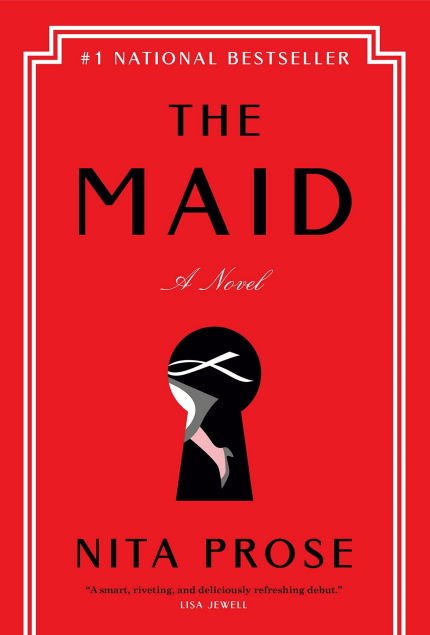The Maid, by Nita Prose

The Maid by Nita Prose
My rating: 1 of 5 stars
From whatever point of view: This is a disgrace of a book.
Let’s look at the story itself first: Molly, usually referred to and sometimes self-referring as “Molly the Maid” (as if that’s all she is), works as a maid in the Regency Grand Hotel.
One day, when she’s cleaning a suite she finds the body of Mr. Black, a rich “power magnate”, who stays at the hotel with his second wife, Giselle.
While it becomes clear to the reader very quickly that something sinister beyond the murder is afoot, Molly doesn’t recognise it and, thus, quickly becomes the prime suspect in the murder case.
Trying to prove Molly’s innocence Molly and a bunch of coworkers-cum-friends come up with a plan to entrap the true culprit…
So, there’s basically nothing new plot-wise. It is unoriginal and rather boring.
What about the character’s, though? We get to “meet” about 20 people – which is quite a lot but, thankfully, it’s manageable.
The problem here is, though: Most of them are stereotypes and never get a chance to evolve into something real. There’s Mr. Preston, the fatherly good-natured doorman and his sharp lawyer daughter, Charlotte, who doesn’t even know Molly but doesn’t hesitate to post a $800,000 bail for her…
Mr. Black, the corpse, we basically only get to know in passing from descriptions by Molly and his wife no. 2, Giselle Black. Giselle is depicted as a typical trophy wife – thirty-five years her husband’s junior, not only is she neglected (and, of course, having an affair) but also being physically abused. Oh, and, of course, she’s also taking drugs.
Rodney, Giselle’s illicit lover, is pretty much a diabolical enforcer. He’s written so simplistically that we know immediately that he’s going to be one of the “bad guys” when we first encounter him.
There’s also Juan Manuel, a Mexican dishwasher in the kitchen, involved in both the mystery and its resolution. There wasn’t much character description left in Prose’s severely limited repertoire so he has to be content with basically being a male version of Molly.
In a world of latent racism, it’s easy to match the Mexican with Molly…
Speaking of whom: Molly… Now, that’s where Prose really “shines”. As becomes obvious very quickly, Molly is neuroatypical/neurodivergent/on the autism spectrum – whatever you want to call it.
Prose doesn’t mention anything about that even once, though. Instead, she has Molly being called “weird”, “weirdo”, “freak”, “awkward”, “standoffish” by “friend” and “foe” alike.
Molly’s “weirdness” is mostly info-dumped on us but never called what it is – probably to avoid criticism for having written about something the author doesn’t really know anything about.
In her “Acknowledgments” Prose thanks everyone and their dogs and lists their respective roles – but, curiously, none of them seem to have any kind of professional experience with neuroatypical persons.
Prose’s characterisation of Molly reads a lot like plain old guesswork. She seems to have read up on Wikipedia on autism, assembled a list of possible issues and wrote a Molly who’s exhibiting most of them at the same time.
»My truth highlights and prioritizes my lens on the world; it focuses on what I see best and obscures what I fail to understand—or what I choose not to examine too closely.«
That’s still not all, though: Molly isn’t even acting consistently with the way she’s being characterised. She keeps acting out of character completely. From the ultimate innocent “noble savage”, at times she becomes a cunning conspirator, willfully lying by omission, smuggling a gun and even resorting to vigilantism.
»“In my experience, there are times when a good person must do something that’s not quite right, but it’s still the right thing to do.”«
Also, Molly doesn’t even seem to know anything about her condition. She knows full well she’s “different” but she cannot name it. While this might have rung true some decades ago, in this day and age, Molly would know why she is “weird”.
Prose simply avoids identifying Molly’s issues as neuroatypical in order to avoid being held responsible for an accurate, consistent and fair depiction. As it stands, Prose can always try and wiggle her way out of it by simply disavowing that she ever meant anything beyond what she calls Molly – “socially awkward”.
Maybe she did some shallow “research” because – judging by her LinkedIn profile – Prose (or rather: Pronovost) has no prior professional experience with neuroatypical people.
While obviously not applying it to herself, Prose knows full well what she’s doing:
»“Sometimes life isn’t fair,” Charlotte adds. “And if there’s one thing I’ve learned over years of practice, it’s that there’s no shortage of criminals out there who will prey on a person’s difference for their personal gain.”«
I consider that shameful and despicable.
Last and, in fact, least: This book is full of “calendar wisdom” of questionable truthfulness:
»The longer you live, the more you learn. People are a mystery that can never be solved. Life has a way of sorting itself out. Everything will be okay in the end. If it’s not okay, it’s not the end.«
One out of five stars and an especially strong recommendation to stay away from this if you’re on the spectrum yourself.
View all my reviews